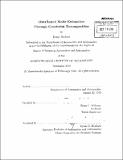Distributed mode estimation through constraint decomposition
Author(s)
Badaro, Henri
DownloadFull printable version (7.238Mb)
Other Contributors
Massachusetts Institute of Technology. Dept. of Aeronautics and Astronautics.
Advisor
Brian C. Williams.
Terms of use
Metadata
Show full item recordAbstract
Large-scale autonomous systems such as modern ships or spacecrafts require reliable monitoring capabilities. One of the main challenges in large-scale system monitoring is the difficulty of reliably and efficiently troubleshooting component failure and deviant behavior. Diagnosing large-scale systems is difficult because of the fast increase in combinatorial complexity. Hence, efficient problem encoding and knowledge propagation between time steps is crucial. Moreover, concentrating all the diagnosis processing power in one machine is risky, as it creates a potential critical failure point. Therefore, we want to distribute the online estimation procedure. We introduce here a model-based method that performs robust, online mode estimation of complex, hardware or software systems in a distributed manner. Prior work introduced the concept of probabilistic hierarchical constraint automata (PHCA) to compactly model both complex software and hardware behavior. Our method, inspired by this previous work, translates the PHCA model to a constraint representation. This approach handles a more precise initial state description, scales to larger systems, and to allow online belief state updates. Additionally, a tree-clustering of the dual constraint graph associated with the multi-step trellis diagram representation of the system makes the search distributable. Our search algorithm enumerates the optimal solutions of a hard-constraint satisfaction problem in a best-first order by passing local constraints and conflicts between neighbor sub-problems of the decomposed global problem. The solutions computed online determine the most likely trajectories in the state space of a system. Unlike prior work on distributed constraint solving, we use optimal hard constraint satisfaction problems to increase encoding compactness. We present and demonstrate this approach on a simple example and an electric power-distribution plant model taken from a naval research project involving a large number of modules. We measure the overhead caused by distributing mode estimation and analyze the practicality of our approach.
Description
Thesis (S.M.)--Massachusetts Institute of Technology, Dept. of Aeronautics and Astronautics, 2010. Cataloged from PDF version of thesis. Includes bibliographical references (p. 131-134).
Date issued
2010Department
Massachusetts Institute of Technology. Department of Aeronautics and AstronauticsPublisher
Massachusetts Institute of Technology
Keywords
Aeronautics and Astronautics.